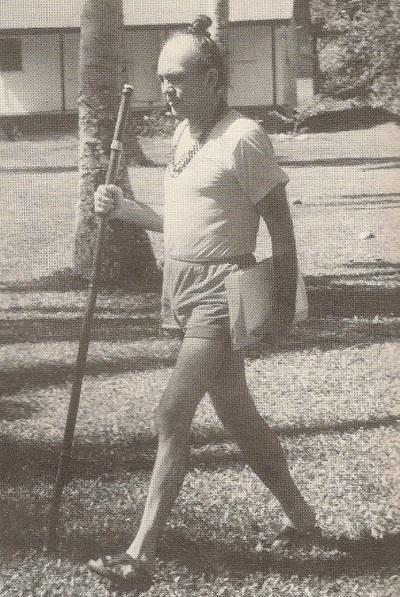![Blank holding line]()

Edited by Beezone
Orignial published in Crazy Wisdom Magazine,
September/October 1986, Vol.5, No. 9.
ADI DA SAMRAJ: I have asked that some notes I
gave this afternoon be read and commented on. They are about
a discipline in daily life. They are about “Sila”. I’ve
noitced there is a certain habit of imbalance and
inattention, or the misuse of attention, or the failure of
Sila among many of you.
Lack of Sila, produces not only failures in what one
does, but even physical discomfort or disturbance.
There is a constant tendency to act without
the discipline of Sila. In other words, people are
tending to live out of balance, and therefore are
inattentive to what is precisely required in the
moment. As a result, there are constant disturbances
and poor function.
If this is done constantly in all the ordinary and
petty details of daily life, to the effect of inefficiency
and disturbance, imagine how this lack of Sila is disturbing
the course of your Spiritual life and preventing it from
being fulfilled!
It is because of this lack of Sila that people have spent
so many years in developing the practice, and are still only
beginning. They do not “hear”
enough of the Teaching to put it into action, and they are
too much out of balance, in fact, to do anything but
constantly struggle with their imbalance. This matter of
Sila is a very important one. Without Sila, you are
constantly creating chaos by not understanding
communications and not fulfilling them in a balanced and
efficient way. The absence of Sila corrupts your daily life
and obstructs your Spiritual life. Sila is important in
ordinary human relations and basic to the practice of the
Way.
The absence of Sila is imbalance in the body-mind and
unavailability of attention. The essence of Sila, therefore,
is balance of the body-mind, discipline of the body-mind,
control of the body-mind, and freedom or availability of
attention. To practice Sila, then, is to discipline the
body-mind, on the basis of real self-observation and
self-understanding, and to grant attention to that which
deserves attention.
The ability to control the body-mind, discipline it, and
keep it in a balanced state is the first of the two basic
dimensions of discipline. The second is the ability to have
attention available for what requires attention. That is,
the second dimension of discipline is the ability to have
attention not only for the Spiritual Process in its ultimate
form, but also for whatever requires attention in the course
of your sadhana, even ordinary matters.

Sila is the essence of your practice. If you do not
understand yourself, then you do not know how to develop the
practical discipline of the body-mind. If you do not hear me
and “see” me and enter into the Way in its fullest sense,
then your attention will be preoccupied with less than the
fullness of practice. You will tend to spend your life in
the earlier stages of practice, because your intention, or
your habit, is to fulfill the ordinary purposes of life, the
purposes of the first three stages of life and the frontal
personality, rather than the Purpose of the Divine Person,
Which is Realization of the Divine Condition.
Without Sila, therefore, there is no practice, and
likewise without Sila there is no peace in daily life. The
absence of Sila is the root-source of disturbances
everywhere in daily life, and perhaps it is the best way to
explain why people do not quickly advance through the stages
of practice. You could say that even the Ultimate
Realization is about Sila, the discipline or transcendence
of the body-mind and the discipline of attention. Ultimately
the Way is to discipline attention by transcending attention
in its Source.
Everything I have to say to you is about Sila. Nothing
could be more important, in ordinary life or in the practice
of the Way, than Sila, the discipline of the body-mind and
of attention. Let everyone understand this and truly hear
me.
I have been telling you this for years on end. Therefore,
let nobody have any vague misunderstanding or weak
appreciation of the necessity for discipline of the
body-mind and of attention in the practice of this Way. The
Way that I have Given to you is not a practice for fools, or
distracted people, or neurotic cultists. It is a profound
Process that requires great discipline. More and more
discipline develops over time, that is true, but discipline
must be present even at the beginning.
People are either doing or thinking or saying instead of
listening and hearing and observing. This is a habit
associated with the lack of Sila, a habit associated with
imbalance, lack of discipline in the body-mind, lack of
discipline of energy or what the traditions call outgoing
exuberance, the all-over-the-place expansive tendency.
However, the lack of Sila is not just outgoing exuberance.
Dullness, lack of energy, and inattentiveness are also
reflections of the lack of Sila.
Sila is about two things, just as the practice of this
Way of life and its Wisdom are about two things. Sila is
about the discipline of the body-mind on the one hand, and
the discipline of attention on the other. The Way itself is
about such discipline. Without Sila there is no practice.
The absence of Sila is the absence of discipline or control
over the body-mind on the one hand, and on the other hand an
absence of discipline of attention, or the ability to use
attention effectively for the Great Purpose or even for very
ordinary purposes.
Therefore, the Way itself has two fundamental areas of
discipline or practice. One is the discipline of the
body-mind and the understanding that will move you to
discipline the body-mind-really everything that is about
hearing. And the other is
the discipline of attention and everything that moves you to
discipline attention-basically everything that is seeing,
everything that is about Transmission or Awakening,
everything that is about the process of Ishta-Guru-Bhakti
Yoga in our Way.
There is no such Yoga, which is ultimately about the
discipline of attention or the transcendence of attention in
the Transcendental Divine Reality, without the discipline of
the body-mind. And you will not discipline the body-mind
until you can listen. You must be attentive just to hear.
You must be balanced in some basic sense to grasp even the
most mundane aspects of what must be heard.

The result of listening and hearing is the self-generated
disposition to discipline the body-mind. The more fully and
profoundly and effectively you do that, the more profound
your practice wili be ultimately and the more effective your
practice will be Spiritually. To the degree there is
weakness in Sila, or discipline of the body-mind, to that
very degree your practice and realization will be weak,
slow, and based on misunderstandings. To the degree you are
weak in understanding, weak in Sila, weak in the discipline
of the body-mind, to that degree you will not see, you will
not receive the Divine Transmission, you will hardly even
notice It, perhaps. You will not fully receive the
Spirit-Baptism, and even if you receive something of It, you
will not practice Ishta-Guru-Bhakti Yoga, you will not
practice the Way in that full form, with that full
understanding, or with the extraordinary signs associated
with just that Process. Therefore, self-understanding and
the discipline of the body-mind are profoundly
important.
You cannot practice this Way by simply making a practice
out of the discipline of the body-mind, trying to clean up
its act, purify it willfully, realize something great by
simply disciplining the body-mind and doing various things
with it. No. There must also be the ultimate discipline of
attention. The body-mind must be submitted to the discipline
of attention. There must be seeing, there must be
Transmission, there must be an Awakened relationship to That
Which Transcends all, to the very Divine Person or
Condition, and to the Agency of that One, Which is the
Graceful Means whereby the devotee passes fully into the
Ultimate Realization.
All this depends on Sila, and there is no Sila for the
Ultimate Process if there is no Sila in ordinary life.
Ordinary life is a good place for you to find out about the
effectiveness and strength and clarity of your practice. Are
you in a balanced state? Are you self-generating real
conservative discipline of the body-mind so that you are
basically at ease, flowing in your activity, effective in
what you do, able to observe or listen to what needs to be
observed or heard in order to find out what you need to do?
Or are you constantly creating confusion and disturbance,
forcing others to ask for things over and over again, or
having things pointed out to you over and over again,
thereby using up others’ energy? Are you constantly failing
to observe things as they are? Are you generally out of
balance and preoccupied with your doings and thinkings and
sayings, so that you do not have any free attention to
observe what is, apart from your doings and thinkings and
sayings?
If in your daily life you observe an imbalance in the
body- mind, a lack of discipline of the body-mind, and an
unavailability of attention, or a scatteredness of
attention, a preoccupation of attention, a lack of
discipline of attention, then this is a certain gauge of
your Spiritual life, of hearing and seeing and your ability
to practice this Way. Use your daily life, then, as a
circumstance in which to develop Sila, by observing yourself
in every circumstance and thereby learning how to conserve
the body-mind-and, to begin with, learning why to do
that.
By improving Sila in the daily circumstances of life, you
will see that you will improve your capacity to hear and see
and practice altogether, and in ultimate terms. It is easier
to discover these faults of Sila in the ordinary
circumstance of your daily life than it is perhaps to
observe them in terms of the Spiritual Process in its
ultimate sense. How able are you at the moment to judge the
significance of non-Realization? You cannot judge it fully
and completely because it is not there to be observed in the
ultimate sense. But you can certainly observe the
significance of psycho-physical imbalance and lack of
attention in your ordinary life. You can certainly observe
yourself as you are by tendency, come to self-understanding,
develop discipline, and on that basis, through hearing, be
better prepared for seeing or reception of Spiritual
Blessing, for practice in response to the Ishta-Guru, for
development of the Way altogether, for sensitivity to the
Spiritual Reality moment to moment.
The Process begins in reality, on the realistic, rather
than on the idealistic, level of self-observation in the
context of your life or what you are by tendency. What you
do by tendency is readily available to you moment to moment.
It is an excellent field in which to develop and improve
this Way of life. Apart from Ultimate Realization, and
Realization in every detail of the Process that becomes
Ultimate Realization, how do you know what ideals to put
before you as goals? How would you know, in other words, how
to create the Way on the basis of idealistic propositions?
You can develop the Way, however, on the basis of real life,
real self-observation, real responsiveness.
If you observe yourself in reality and observe the
consequences of your life of tendency, you must, if you hear
me, if you understand me, know that it is necessary to
develop Sila, or the conservative discipline of the
body-mind and the Spiritual discipline of attention.
Let this consideration be used by everyone. We have made
a useful lesson for all devotees.
The absence of Sila is imbalance in the body-mind and
unavailability of attention. The essence of Sila, therefore,
is balance of the body-mind, discipline of the body-mind,
control of the body-mind, and freedom or availability of
attention. To practice Sila, then, is to discipline the
body-mind, on the basis of real self-observation and
self-understanding, and to grant attention to That Which
deserves attention.
Now, very often your practice of Sila is to listen when I
ask you to do something, either in the form of some personal
service or in the form of my Instruction to you about
Spiritual life. At other times it is to bring attention to
your daily life-relations and what is needed therewhat
your service should be, and so on. Without Sila, you are
constantly creating chaos by not understanding
communications and not fulfilling them in a balanced and
efficient way. The absence of Sila corrupts your daily life
and obstructs your Spiritual life.
My call to the discipline of service is fundamentally a
call to Sila. The basic practices are the same as they have
always been. What will you assume, therefore? You will
assume some very basic disciplines that conserve and
discipline the body-mind relative to such things as
sexuality’, for instance, and that maximize attention to the
Way itself, the Spiritual Process itself. The fullest
understanding of this Process, the Yoga of the Way that I
have Revealed to you, is the Ishta-Guru-Bhakti
The ability to control the body-mind, discipline it, and
keep it in a balanced state is the first of the two basic
dimensions of discipline. The second is the ability to have
attention available for what requires attention. That is,
the second dimension of discipline is the ability to have
attention not only for the Spiritual Process in its ultimate
form, but also for whatever requires attention in the course
of your sadhana, even
If you do not understand yourself, then you do not know
how to develop the practical discipline of the body-mind. If
you do not hear me and “see me and enter into the Way
in its fullest sense, as Ishta-Guru-Bhakti Yoga, then your
attention will be preoccupied with less than the fullness of
practice. You will tend to spend your life in the earlier
stages of practice, because your intention, or your habit,
is to fulfill the ordinary purposes of life, the purposes of
the first three stages of life and the frontal personality,8
rather than the Purpose of the Divine Person, Which is
Realization of the Divine Condition.
![Blank holding line]()
|


